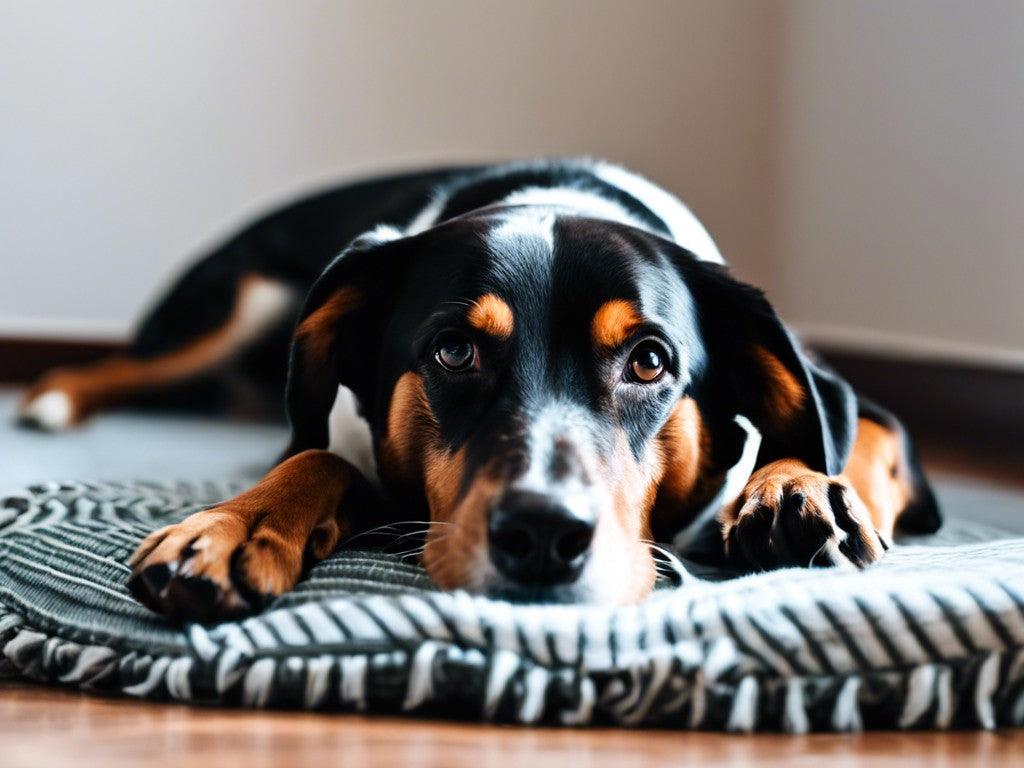

· By Brendan Monahan
How To Calm Dog Anxiety Naturally
Is your dog stressed by thunderstorms, strangers, car rides or being left alone? Uneasiness, restlessness and “fidgets” are very common in dogs and can lead to destructive behaviors, excessive barking, house soiling and more. While stress-reducing medications are an option, many pet owners prefer natural methods to calm their anxious dogs. With some simple techniques and natural supplements like Brave Paws, you can help ease your dog’s apprehensive behavior.
Understanding Dog Stress and Nervousness
Stress in dogs is similar to stress in people - it’s excessive worry in response to specific triggers that causes physical and behavioral symptoms. Common categories of dog stress and uneasiness include:
- Separation: Distress when left alone or separated from their human.
- Noise Phobias: Fear of loud noises like thunder, fireworks, gunshots.
- Travel: Stress in the car, anxiety over new environments.
- Strangers: Fear or wariness around unfamiliar people.
- Age-Related Nervousness: Confusion and uncertainty in senior dogs.
Dog Stress and Apprehension Signs
Signs your dog is feeling uneasy may include pacing, panting, whining, trembling, hiding, loss of appetite and more. While some distress symptoms are normal, excessive, ongoing distress is problematic for dogs and pet parents alike.
Natural Ways to Calm Your Dog
Before trying medications or supplements, here are some natural ways to help soothe an anxious dog:
- Create a Calm Home Environment: Use pheromone sprays and diffusers, play calming music and limit loud noises.
- Stick to a Routine: Consistency and schedule helps reduce uncertainty.
- Crate Train: Gives dogs a safe den-like space when alone.
- Plenty of Exercise: A tired dog is less likely to experience stress. Go for long walks.
- Obedience Training: Reinforces you as the calm leader. Practice “settle” and “relax”.
- Massage and Belly Rubs: Soothing touch releases calming endorphins.
- Anxiety Wraps/Vests: Gentle pressure has a calming effect.
- Distractions: Food puzzles, chew toys like a frozen Kong® can redirect anxiety behaviors.
- Essential Oils: Lavender, chamomile and vanilla have calming scents.
- Training: Counterconditioning and desensitization helps overcome specific fears.
When Natural Methods Fail: Brave Paws to the Rescue
Sometimes natural techniques aren’t enough for an extremely upset dog. This is where apprehension-reducing supplements like Brave Paws can provide extra support. Brave Paws is a plant-based calming chewable clinically shown to reduce stress and worry in dogs.
The active ingredients in Brave Paws are:
- Souroubea – A vine traditionally used in South American medicine for its soothing properties. It’s been proven in studies to moderate cortisol levels in anxious dogs.
- Sycamore Bark – Contains compounds believed to have natural anxiolytic effects based on historical medicinal use.
In a placebo-controlled study of thunderstorm noise induced dread, dogs given Brave Paws showed significantly less uneasiness and more normal behavior compared to dogs receiving a placebo. Brave Paws also reduced their stress hormone (cortisol) levels.
Brave Paws starts working within 30-60 minutes to promote relaxation without sedating your dog. Offer Brave Paws regularly to manage ongoing issues like separation or situations like car rides, vet visits or kennel boarding. Over 60 reviews report excellent results for apprehensive dogs.
The natural botanicals in Brave Paws are sustainably sourced and non-GMO. Brave Paws is also free of soy, corn, grain, CBD, THC and other harsh additives. It has a beef flavor dogs love.
A Multifaceted Approach to Calm Your Canine
Stress and unease can be complex in dogs, with numerous triggers and contributing factors. Using natural stress-busting techniques along with Brave Paws calming chews provides a layered, comprehensive approach to ease your dog’s worries. Always consult your vet first to identify and address any medical issues exacerbating your dog’s distress as well. With patience and the right mix of solutions tailored to your dog’s needs, you’ll be well on your way to a calmer, less stressed furry friend.

